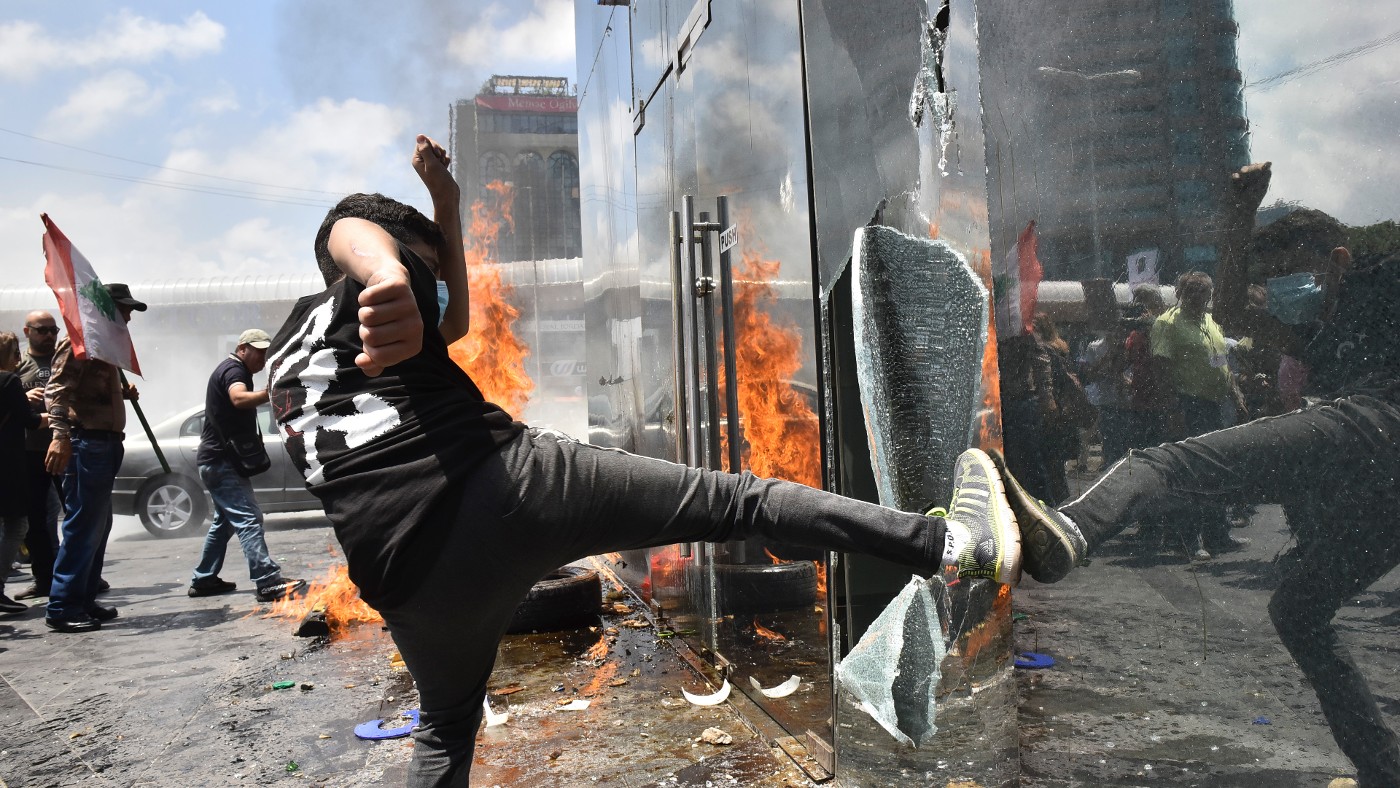Instant Opinion: ‘Boris Johnson’s peers disgrace the House of Lords’
Your guide to the best columns and commentary on Thursday 6 August

A free daily email with the biggest news stories of the day – and the best features from TheWeek.com
You are now subscribed
Your newsletter sign-up was successful
The Week’s daily round-up highlights the five best opinion pieces from across the British and international media, with excerpts from each.
1. David Aaronovitch in The Times
on an ex-Trotskyist and IRA backer in the chamber
The Week
Escape your echo chamber. Get the facts behind the news, plus analysis from multiple perspectives.

Sign up for The Week's Free Newsletters
From our morning news briefing to a weekly Good News Newsletter, get the best of The Week delivered directly to your inbox.
From our morning news briefing to a weekly Good News Newsletter, get the best of The Week delivered directly to your inbox.
Boris Johnson’s peers disgrace the House of Lords
“Some questions are easier to answer than others. Like: what has the billionaire thrower of expensive parties and provider of luxury hospitality Evgeny Lebedev got that I haven’t got? Apart, that is, from a seat in the House of Lords? Mr Lebedev, the son of a former KGB man who managed to emerge from the ruins of the Soviet Union owning quite a bit of it, is, of course, a newspaper proprietor. If my father had been a billionaire oligarch maybe I’d have owned a newspaper too. Perhaps I would also have rebuilt a castle in Umbria and invited Boris Johnson and whoever was his spouse at the time for weekends along with other celebrities, and flown them home at my own expense... But the Lebedev peerage, and its contribution to inflating the second chamber, is a relatively minor hypocrisy compared with ennoblement of Claire Fox... A member of a Trotskyist sect, the Revolutionary Communist Party (RCP), from the early 1980s until its disbandment in the 1990s, Ms Fox took the most extreme line on endorsing the IRA’s ‘armed struggle’. The party and its front organisation, the Irish Freedom Movement (IFM), stood in solidarity with republican terrorism.”
2. Dr Rita Issa, a British doctor with family in Lebanon, in The Independent
on a nation on its last legs
A free daily email with the biggest news stories of the day – and the best features from TheWeek.com
Now is the time for action – not just kind words – to help a devastated Beirut
“It is on this backdrop: refugee crisis, economic crisis, massive debt, electricity shortages, and years of corruption, that coronavirus hit. Just five days ago, hospitals declared that they would be inundated within a fortnight, unable to care for the rising numbers of coronavirus cases in the context of scarce medical supplies, an inability to pay staff, and a lack of electricity. A catastrophe like that which hit Beirut on Tuesday would be horrific for any country, but for Lebanon the timing couldn’t be worse. The majority of grain supplies have been lost in the explosion and the port is destroyed. 300,000 people have been left homeless. At least four hospitals were severely damaged by the blast. This is now undoubtedly a humanitarian emergency. Whilst prayers and platitudes may warm the heart, they do little to tangibly change the reality for those on the ground. For those of us watching heartbroken from the UK, now seems an apt time to reflect on the merger of the Foreign Office with the Department for International Development. The latter is internationally recognised for its aid effectiveness and humanitarian responsiveness - exactly what countries like Lebanon need.”
3. Patrick O’Flynn in The Daily Telegraph
on getting children back in the classroom
The Tories need Thatcher-like strength to crush the unions stopping our schools’ return
“There is an old saying about never bringing a knife to a gun fight, yet so woefully under-prepared is Education Secretary Gavin Williamson in his battle to reopen all schools fully in September that he might as well be turning up with a feather duster. Already humiliated once by teaching unions who crushed his plan to get schools up and running again before the long summer holidays, Williamson and his Schools Minister Nick Gibb are in acute danger of presiding over a re-run. Political welterweight Williamson tells us that: ‘Getting all children back into the classroom, full-time at the start of next month is a national priority, as this is the best place for them to be.’ He will get no argument about that from millions of parents who have had to juggle their own work commitments alongside supervising their children’s learning for several months now.”
4. Ai Weiwei, an artist and activist, in The Guardian
on taming China on the global stage
Think ‘sanctions’ will trouble China? Then you're stuck in the politics of the past
“Are sanctions the way to go? A foreign ministry spokesperson in Beijing recently remarked words to the effect that the US and China are so economically interlocked that they would amount to self-sanctions. The US, moreover, would be no match for China in its ability to endure suffering. And there he was correct: in dictatorships, sacrifices are not borne by the rulers. In the 1960s Mao said: ‘Cut us off? Go ahead – eight years, 10 years, China has everything.’ A few years later Mao had nuclear weapons and was not afraid of anyone. The west needs to reconsider its systems, its political and cultural prospects, and rediscover its humanitarianism. These challenges are not only political, they are intellectual. It is time to abandon the old thinking and the vocabulary that controls it. Without new vocabulary, new thinking cannot be born. In the current struggle in Hong Kong, for example, the theory is simple and the faith is pure. The new political generation in Hong Kong deserves careful respect from the west, and new vocabulary to talk about it. ‘Sanctions’ is a cold war term that names an old policy. If the US can’t think beyond them, the primacy of its position in this changing world will disappear.”
5. Jim Tankersley in The New York Times
on learning the lessons of World War Two
Where Will the New Good Jobs Come From? Look Here
“The economy thrived after World War II in large part because America made it easier for people who had been previously shut out of economic opportunity - women, minority groups, immigrants - to enter the work force and climb the economic ladder, to make better use of their talents and potential. In 1960, cutting-edge research from economists at the University of Chicago and Stanford University has documented, more than half of Black men in America worked as janitors, freight handlers or something similar. Only 2 percent of women and Black men worked in what economists call ‘high-skill’ jobs that pay high wages, like engineering or law. Ninety-four percent of doctors in the United States were white men... Women and nonwhite men gradually chipped away at those barriers, in fits and starts. They seized opportunities, like a war effort creating a need for workers to replace the men being sent abroad to fight. They protested and bled and died for civil rights. And when they won victories, it wasn’t just for them, or even for people like them. They generated economic gains that helped everyone... America’s ruling elites did not learn from that success.”
-
 ‘Restaurateurs have become millionaires’
‘Restaurateurs have become millionaires’Instant Opinion Opinion, comment and editorials of the day
-
 Earth is rapidly approaching a ‘hothouse’ trajectory of warming
Earth is rapidly approaching a ‘hothouse’ trajectory of warmingThe explainer It may become impossible to fix
-
 Health insurance: Premiums soar as ACA subsidies end
Health insurance: Premiums soar as ACA subsidies endFeature 1.4 million people have dropped coverage
-
 The RAAC concrete crisis: fears spread to hospitals, homes and theatres
The RAAC concrete crisis: fears spread to hospitals, homes and theatresfeature Experts call for tens of thousands of buildings to undergo safety checks as crumbling schools scandal escalates
-
 Children trapped 900ft in the air in Pakistani cable car emergency
Children trapped 900ft in the air in Pakistani cable car emergencySpeed Read A helicopter rescue effort has been launched to save the stranded group of eight
-
 ‘Irony’ as Zoom calls staff back to office
‘Irony’ as Zoom calls staff back to officefeature And other stories from the stranger side of life
-
 A country still in crisis: Lebanon three years on from Beirut blast
A country still in crisis: Lebanon three years on from Beirut blastfeature Political, economic and criminal dramas are causing a damaging stalemate in the Middle East nation
-
 The U.S. veterinarian shortage crisis
The U.S. veterinarian shortage crisisSpeed Read With an anticipated shortage of 15,000 vets by 2030, it will be harder to get care for pets
-
 Boris Johnson shocks UK by resigning from Parliament
Boris Johnson shocks UK by resigning from ParliamentSpeed Read
-
 Company teaches mask-wearers to smile again
Company teaches mask-wearers to smile againfeature And other stories from the stranger side of life
-
 Bees delay flight for three hours
Bees delay flight for three hoursfeature And other stories from the stranger side of life